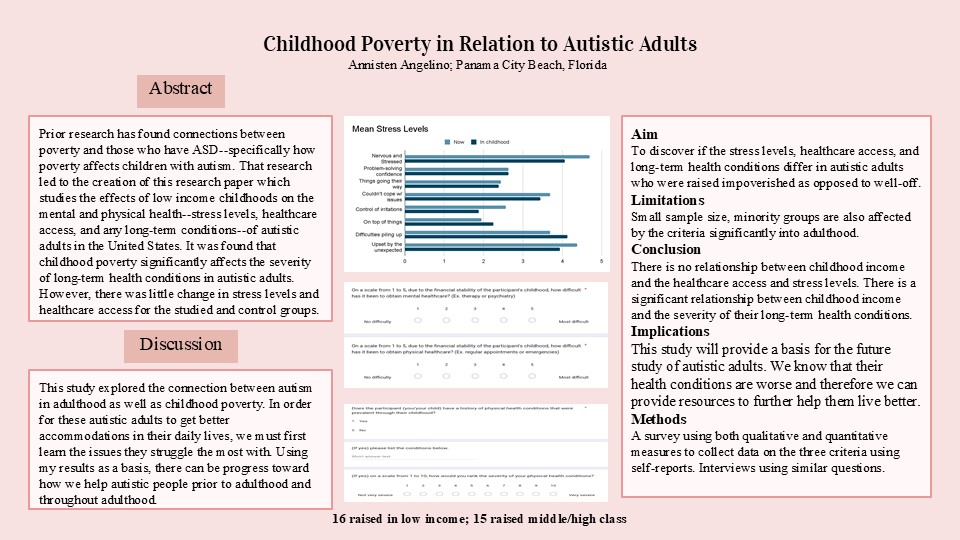Student Research Symposium Program Portal: Submission #111
Submission information
Submission Number: 111
Submission ID: 8126
Submission UUID: da23b5e5-1769-4e6d-a5ad-5e394a0291b0
Submission URI: /student-research/symposium/research-symposium-program-portal
Submission Update: /student-research/symposium/research-symposium-program-portal?token=oNFF8GAR2L5_Dck4GvWrQ4XJ7AhSUrPaeA641z8OZeY
Created: Fri, 02/07/2025 - 07:34 PM
Completed: Fri, 02/07/2025 - 07:43 PM
Changed: Wed, 04/16/2025 - 12:08 PM
Remote IP address: 68.47.157.183
Submitted by: Anonymous
Language: English
Is draft: No
Webform: Research Symposium Program Portal WF
Submitted to: Student Research Symposium Program Portal
Annisten
Angelino
She/her

N/A
I am interested in the human brain and mental illness. I have done many years of research on how the environment and mental state affect each other. For college, I plan on pursuing a business degree--though that is still being decided--and will eventually pursue my many interests.
Childhood Poverty in Relation to Autistic Adults
Autism spectrum disorder (ASD) is a neurodevelopmental disorder that affects around 54 million people. Prior research has found connections between poverty and those who have ASD--more specifically how poverty affects children with autism. The pre-existing research led to the creation of this research paper which studies the effects of low income childhoods on the mental and physical health--stress levels, healthcare access, and any long-term conditions--of autistic adults in the United States.
In order to fully assess the effects of low income childhoods on autistic adults in the US, there were three methodology tools utilized: a series of quantitative data within a questionnaire, qualitative data as collected by the questionnaire, and interviews both online and face-to-face.
Results are still in the process of being collected. The abstract will be edited to include results by March 12th.
In order to fully assess the effects of low income childhoods on autistic adults in the US, there were three methodology tools utilized: a series of quantitative data within a questionnaire, qualitative data as collected by the questionnaire, and interviews both online and face-to-face.
Results are still in the process of being collected. The abstract will be edited to include results by March 12th.
Kimberly Morehead
J. R. Arnold High School
ESE Department
morehke@bay.k12.fl.us
{Empty}
{Empty}
Autism, adults, mental illness, poverty, income, ASD
C - 7 R - 1
Complete
Face to Face Poster session

Yes
2025
5th annual Undergraduate Research Symposium, April 17, 2025
https://pc.fsu.edu/student-research/symposium/research-symposium-program-portal?element_parents=elements/student_photo&ajax_form=1&_wrapper_format=drupal_ajax&token=oNFF8GAR2L5_Dck4GvWrQ4XJ7AhSUrPaeA641z8OZeY
{Empty}
